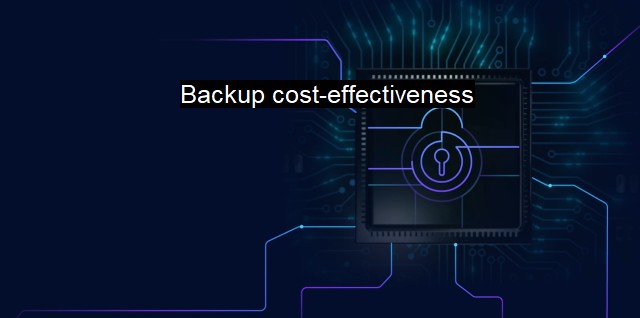What are Backup cost-effectiveness?
Effective Backup Strategies in Cybersecurity: Countering Data Loss and Minimizing Costs Using Antivirus Software
Backup cost-effectiveness revolves around data protection strategies that ensure the absolute safety, security, and availability of data while ensuring spending efficiency. This aspect is extremely critical in the realm of cybersecurity and antivirus; the approach involves implementing a mix of backup solutions that deliver high efficacy at managing threats combined with economic cost structures that protect businesses from financial burden.The era of digitalization has prompted a surge in cyber threats, making cybersecurity an indispensable part of businesses, regardless of their size. Cybersecurity involves executing preventative measures to guard against malware, ransomware, phishing, social engineering attacks, and an array of other sophisticated cyber threats. Among these strategies, data backup holds a key position, providing the ultimate failsafe against catastrophic data loss scenarios.
Now onto understanding backup cost-effectiveness, it convenes the intersection of risk management and economic resource utilization in the cybersecurity landscape's context. It's about strategizing data backup in a way that minimizes the financial burden while maximizing data protection. The exact formula for backup cost-effectiveness differs based on an organization's size, data set, industry regulations, threat slide, and budget.
'Backup cost-effectiveness', therefore, suggests outlines to decide how often backups should occur, what type of data must be preserved, and how long these backups should be kept in a cost-efficient manner. Primarily, it includes assessing the value of data and understanding the real cost of data loss to the business, focusing on mitigating these risks with minimum financial implications.
Antivirus software acts as the first line of defense against most threats. some threats get through these defensive barriers due to continuous evolution and innovation in the methods employed by attackers. Conversely, backing up data provides a definite safety net even if a threat eludes all defenses and threaten data's integrity. backing up every byte of data every moment is typically not practical due to storage and cost constraints, necessitating a cost-effective solution.
Achieving a cost-effective backup solution involves strategizing the backup frequency, the data to be backed up, and the period of data storage while considering data recovery needs. It's typically a balance between backup frequency and cost- higher frequency means better protection but increased costs.
To optimize cost-effectiveness in backup processes, businesses might prioritize data deemed crucial for operations and backup these pieces of data more frequently. Simultaneously, data tracked less frequently or rationally stored on cheaper storage solutions provides savings, reserving budget allocation for crucial cyber-defenses or other operational needs. Keeping backup data indefinitely isn't typically cost-effective. Therefore, redundancy is created, defining backup retention periods based on specific business, legal, and compliance requirements.
Another component of a cost-effective backup solution is automation – reducing the need for human intervention reduces costs and decreases chances for error. using data compression and deduplication tools can shrink the size of data backed up, saving on storage space and reducing costs.
Conversely, investing in a cheap backup solution that doesn't provide comprehensive protection can turn out to be more expensive in the long run. It's worth noting that while cost is an important factor, it shouldn't compromise the quality and effectiveness of the backup solution.
Businesses need to invest in backup solutions that safeguard their sensitive data against any potential threat without imposing significant financial constraints — attaining an effective, secure, cost-efficient balance. Achieving backup cost-effectiveness thus requires keen strategizing, productive spending, and continuous assessment to ensure effective data protection at reasonable costs. It's not just about being economical but ensuring an optimal balance between cost, risk, and value.

Backup cost-effectiveness FAQs
What is backup cost-effectiveness in the context of cybersecurity and antivirus?
Backup cost-effectiveness in the context of cybersecurity and antivirus refers to the ability of a backup solution to provide reliable data protection at an affordable cost. This includes factors such as the backup software cost, hardware infrastructure cost, and ongoing maintenance costs.Why is backup cost-effectiveness important in cybersecurity?
Backup cost-effectiveness is important in cybersecurity because it ensures that businesses can afford to implement a backup solution that effectively protects their data. The cost of a backup solution should not be an obstacle in ensuring data protection because losing data can be more expensive in the long run.What factors should businesses consider when evaluating the cost-effectiveness of a backup solution in cybersecurity?
Businesses should consider various factors when evaluating the cost-effectiveness of a backup solution in cybersecurity. These include the initial cost of the backup software, hardware infrastructure cost, ongoing maintenance costs, and the time it takes to restore data in case of a cyber attack.Can businesses achieve cost-effective backup solutions without compromising data security and antivirus protection?
Yes, businesses can achieve cost-effective backup solutions without compromising data security and antivirus protection. By using a reliable backup solution that has strong security features, businesses can ensure that their data is protected while keeping the cost of implementation and maintenance low. It is important to choose a backup solution that has a good balance of cost-effectiveness, security, and functionality.| | A | | | B | | | C | | | D | | | E | | | F | | | G | | | H | | | I | | | J | | | K | | | L | | | M | |
| | N | | | O | | | P | | | Q | | | R | | | S | | | T | | | U | | | V | | | W | | | X | | | Y | | | Z | |
| | 1 | | | 2 | | | 3 | | | 4 | | | 7 | | | 8 | | |||||||